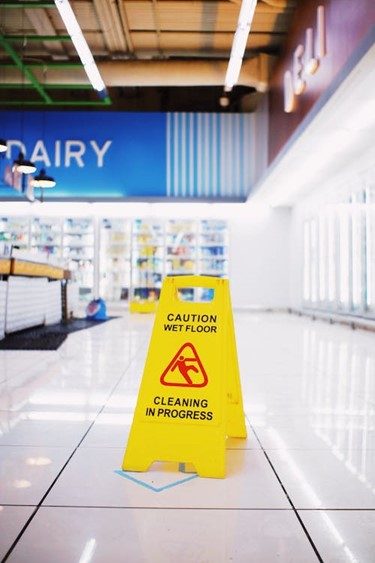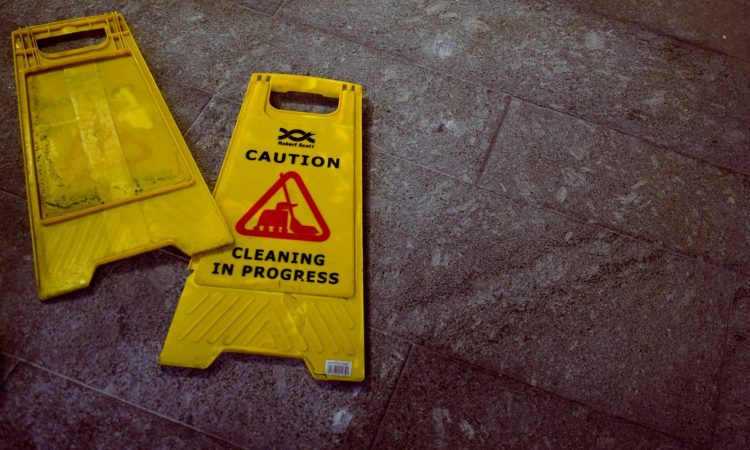
What is the Occupiers Liability Act 1957- a basic overview
Accidents which take place on property or land owned by somebody else are called Occupiers Liability Claims and they are very common. Examples are, but not limited to, slips in supermarkets or nightclubs due to a spillage not being cleaned up, injury that is sustained due to someone failing to tidy up or make an area of a building safe, trips/ falls as a result of badly fitted or damaged flooring, or being struck by a falling object.
The 1957 Act was enacted to regulate the duty of care which an occupier of a premises owes to its visitors. Section 2 of the act states that the duty of the occupier is to ‘take such care as in all the circumstances of the case is reasonable to see that the visitor will be reasonably safe in using the premises for the purpose for which he or she is invited or permitted by the occupier to be there’.
Please note that the duty is to make the visitor safe and not the premises safe. This is a very important distinction.
The question as to what amounts to ‘such care as in all the circumstances a case is reasonable’ depends on assessing and balancing the following factors: –
- The likelihood of injury
- The seriousness of injury which may occur
- The cost of preventative measures
Possible defences available to the Occupier are:
- That the visitor was reasonably safe
- The injury was not a foreseeable injury
- If there was a foreseeable risk of injury it was on balance not reasonable for the Occupier to do anything about the risk or
- The visitor was not taking the degree of care that would ordinarily be expected in a visitor making the accident less foreseeable or meaning that it was less reasonable to impose a duty on the Occupier to prevent it.
It is important to understand that an Occupier has a duty to take reasonable care. It is not an absolute duty to keep all visitors safe. As long as they have acted reasonably in all the circumstances then they may have a defence to the act.
Examples cases using the Occupiers Liability Act
- English Heritage v Taylor
- Cook v Swansea City Council
In English Heritage v Taylor [2016], the claimant suffered a severe head injury as a result of a fall when visiting Carisbrooke Castle on the Isle of Wight.
At one corner of the site, there was an elevated platform. Below the platform was a grass pathway, and a steep slope led from the platform down to the grass pathway.
There was an ‘informal path’ that led down the slope from the platform to the grass pathway. It would have been well known to staff that customers frequently used the ‘informal path’; it was a well-worn track.
Beyond the grass pathway (on the opposite side to the platform and slope), the ground sloped slightly upwards before dropping down sharply into a dry moat. It appears that the claimant, having been on the platform, walked down the informal path towards the grass pathway, where he lost his footing and fell into moat.
The presence of the moat was not obvious to someone taking the route that the claimant had taken. There was no sign warning of the danger.
There was no requirement to warn of obvious risks, but this risk was not obvious. The court found that the defendant was in breach of its duty under the Occupiers Liability Act 1957, but also found that contributory negligence of 50% attached to the claimant.
The court re-iterated the point that it is required to consider all the circumstances. These will include how obvious the danger is and, in an appropriate case, aesthetic matters.
It emphasised that this decision should not be interpreted as requiring occupiers like English Heritage to place unsightly warning signs in prominent positions all over sensitive historic sites. They are required to do no more than take reasonable steps.
In Cook v Swansea City Council, the court carried out a balancing exercise, balancing the obviousness of the risk with the fact that an injury due to slipping on ice might either be minor or severe, the fact that the cost of regularly gritting all such car parks would be disproportionate to the risk, and the concern that, if there was a requirement to grit all unmanned car parks whenever there is a report of icy conditions, this might lead to the closure of car parks at such times, which would cause significant inconvenience to members of the public.
Slipping cases
Slipping cases are a prime example of cases where the Occupiers Liability Act applies. Slipping accidents are most common in the case of shops and supermarkets, or bars and restaurants. Well known slipping cases are:
- Ward v Tesco Stores Ltd
- Hufton v Somerset County Council
The case of ‘Ward’ should certainly be considered in slipping cases. In the context of evidential burdens, it is usually the burden of the Claimant to prove that the Defendant was negligent. In the case of Ward v Tesco Stores Ltd, it is for the Defendant to demonstrate the existence of a proper and adequate system of inspection and that it worked in practice to prevent accidents from occurring.
In the case of ‘Hufton’ Jackson LJ was of the opinion that unlike Ward, the evidence does not show that liquid gathering on the floor was a frequent problem or that there needed to be a special system to ensure prompt mopping up. What the Defendant put in place in this case was a proper system to prevent water being deposited on the assembly hall floor. Unfortunately, that system did not prove effective.
In ‘Ward’, the premise of the decision is that it was proved that the Defendant knew that during the course of a working week there was a likelihood of spillages occurring from time to time.’ The Defendant also knew that the likelihood of spillage posed a danger to customers if the spillage was not dealt with quickly.
What does this mean for Occupiers Liability cases?
An evidential burden upon the Defendant will only arise where the evidence shows that liquid gathered on the floor was a frequent problem or that there needed to be a special system to ensure prompt mopping up, so that it can be alleged that the accident was as a result of the absence of a system that ought to have been in place or failure of that system. Depending on the type of case, the burden of proving this could lie on the Defendant as in ‘Ward’. It must be considered that just because a visitor slips on water or liquid on the floor, this does not make it a ’Ward’ type case.
Where the evidence demonstrates that the spillage had only been present for a short time, the Defendant may escape liability.
In relation to Occupiers Liability claims in general, the court will carry out a balancing exercise, and balance the obviousness of the risk with the risk of injury, and the cost to reduce that risk.
Conclusion
There are a variety of factors that you need to consider when making an occupier’s liability claim. You will need to provide evidence that the premise you were visiting was unsafe. You should try to obtain photographic evidence of what has caused the accident and your injuries. It is also useful to gather statements from anyone who witnessed the accident. Finally, you will need to be able to provide details of exactly where, why and how the accident happened and be clear on what the danger was and how it was preventable.
How Hopkins can help you – Your Local Personal Injury Solicitors
At Hopkins Solicitors we give friendly professional advice without confusing you with legal jargon. Using a local Solicitors when bringing a Personal Injury claim can prove to be more efficient as you are able to have a face-to-face chat with your Solicitor and discuss any questions you have about the court process.
If you have suffered an injury because of the negligence of a Third Party then please do not hesitate to contact us for a free initial consultation (by phone, video or in-person). Our main number is 01623 468468 or complete the enquiry form below.
A qualified member of our team will get in touch on the same day or the next working day.
Request a CallbackRelated Articles
-

Five common mistakes tenants make when entering into a commercial lease
Entering into a commercial lease is a significant decision for any business. Whether you’re a startup looking for your first…
-

Missed Diagnosis of Cauda Equina Syndrome: A Case for Medical Negligence
Cauda Equina Syndrome (CES) is a severe neurological condition that requires urgent medical intervention. A failure to diagnose and treat…
-

Stay Safe This Half-Term: A Guide to Avoiding Injuries During the Easter School Holidays
With the Easter school holidays just around the corner, families are gearing up for a well-deserved break from the usual…